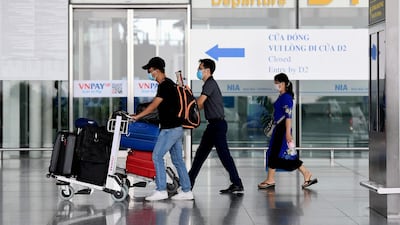Global air travel demand is expected to recover to its pre-Covid-19 crisis levels in about two years though the share of corporate travel segment will diminish, Etihad Airways' chief commercial officer said.
Pent-up demand to visit family and friends will boost passenger numbers but global business travel is unlikely to bounce back to 2019 levels as companies embrace the use of video-conferencing technology, Robin Kamark, Etihad Airways' chief commercial officer said on Monday at the Global Aerospace Summit.
The Covid-19 pandemic has resulted in "structural change" in the industry and the Abu Dhabi-based airline will adapt, he said at the two-day online conference hosted by Abu Dhabi's Mubadala Investment Company and defence group Edge.
"You will not see business travel come back to the levels it was before this crisis. The number of travellers will, for sure, but they will travel for other reasons. Those daily flights in and out for one to three hours – flights for a meeting and back again – will not happen," he said. "We as an airline need to take on board and adapt thereafter."
In July, the International Air Transport Association said it did not expect passenger traffic to return to pre-Covid-19 levels until 2024, a year later than previously projected. The pessimistic projection was based on a number of factors including weak business travel.
"Short term business class travel will fall as businesses cut budgets and also look to focus on employee health," independent aviation consultant John Strickland told The National. "I'd expect some business travel to disappear permanently as we see a structural shift to video conferencing in place of a percentage of the previous market volumes."
The slump in corporate travel demand is expected to persist well into 2021 but will not be permanent, George Ferguson, senior analyst of aerospace, defense and airlines at Bloomberg Intelligence, said.
"We see the business demand cycle following typical downturns in that companies will restrict travel coming out of a recession as earnings recover," he said. "Once earnings recover, corporate travel will rise to a high just as the next recession sets in."
While technology such as Zoom will "peel away" some business travel volume, it cannot replace the process of building relationships that requires more personal interaction, Mr Ferguson said.
To counter the current weak travel demand, airlines have grounded some of their larger aircraft with premium cabins and will need to cut fares to stimulate demand, Mr Strickland said.
The weak business travel outlook could also result in airlines rethinking the premium class offerings onboard their aircraft, according to analysts.
"Medium term I'd expect a refreshed approach to what the business class product proposition represents and also work in strengthening the premium economy product," Mr Strickland said.
Re-configuring the cabins in the aircraft would be too expensive in response to a temporary change and airlines will instead offer business class seating at lower prices and try to attract price-conscious leisure travelers, Mr Ferguson said.
In previous crises, such as the 9/11 attacks, the airlines responded by slashing fares. However, the Covid-19 pandemic presents a different set of challenges such as travel restrictions, cancelled or postponed corporate events globally and weakened travel confidence in the absence of a vaccine – in which reduced fares or re-configured cabins may not work to boost demand, analysts say.
So far, some airlines have resorted to strategies such as blocking the sale of middle seats rather than change their cabins.
"The general view is that the airline business is much less viable with lower density seating, so the approach has been to survive on lower demand and government aid, until a vaccine is available," Teal Group consultant Richard Aboulafia said.
With vaccines against the virus expected next year and with various Covid-19 rapid tests to come available before that, airlines have not made major changes to their cabins, he said.
"The other view is that the problem hasn’t been fear of travel – it’s quarantine restrictions and cancelled events. So here again, cabin changes don’t matter much," Mr Aboulafia said.


